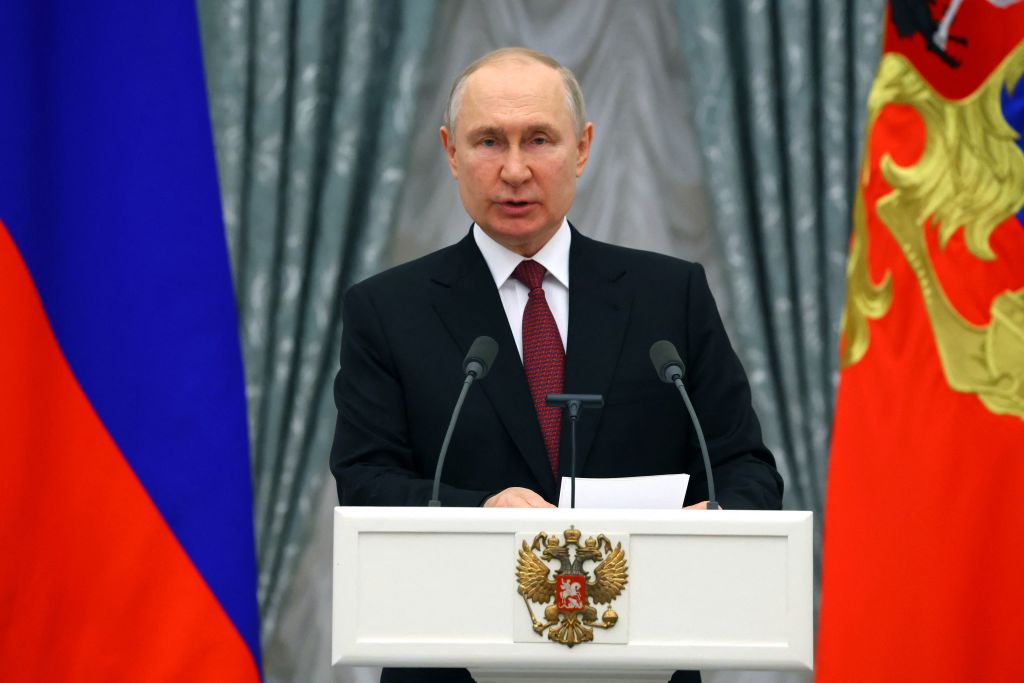Trailed as an historic address to the nation following the weekend’s Wagner rebellion, Vladimir Putin’s short speech on Monday night was instead an unconvincing condemnation of everything generally and nothing much specifically. If the speech was historic, it was only because of the way the president brought up Russia’s historical betrayals and revolutions.
Putin’s (mis)uses of historical grievance often cause bemusement in the West but it serves him well domestically. Replicated by the Kremlin propaganda machine, the president’s messages about the chaotic, desperate 1990s and the long scars of Russia’s bloody twentieth century civil wars are carefully designed to invoke fear of what might follow his exit from power. This is coupled with promises, never quite manifested, of a return to Soviet-era greatness and self-sufficiency. The Kremlin’s incessant replaying of past triumphs and trauma has played a crucial role in Russian people acquiescing to an increasingly authoritarian regime and catastrophically aggressive foreign policy.
But present events have now overtaken Putin’s history lessons. His allusions to civil war and “times of troubles” (historical periods when the state is weak and chaos ensues) only remind people of the instability currently afflicting Russia. Likewise, the comparisons with “neo-Nazi Ukraine,” supposedly a failed state, raise the question why it was in Rostov, not Kyiv, that Russian fighters were welcomed with fanfare, pastries, and selfies.
Putin’s efforts to blame Wagner — and that trusty old villain “the West” — ignore a discomforting reality: that Prigozhin’s complaints about the war’s failures appeal to many ordinary people. First, because he tells the truth, namely that the invasion was based on lies and the war has been fought incompetently. Second, because his “truth” is packaged in a way that consoles the many thousands of Russians who have lost loved ones in Ukraine, and the many millions who feel disoriented by the decision to launch a full-scale invasion in the first place.
The use of “everything is going according to plan” as an ironic catchphrase on Russian social media shows the widespread awareness of the Kremlin’s failed prosecution of the war on Ukraine. But Prigozhin’s tirades and audio messages salvage Russia’s bruised national pride by pinning these failures on corrupt and incompetent elites, whose own children swan around Europe while everyone else is sent to battle without proper equipment or training.
There is little space for Ukrainians in this narrative but this war has always been less about Ukraine than it is about asserting Russian greatness and might. The narrative pushed by Prigozhin — and many others — is that Russian greatness is indisputable, but corrupt elites have siphoned off military funding for themselves.
This anti-elitism appeals to ordinary people, but there are also lots in Putin’s inner circle who sympathize with this reading of the war, even if they have little time for Prigozhin personally. Many of the strongmen who make up Putin’s closest advisors would like to see a wholesale reform of society onto a more militaristic footing and a purging of the military top brass for more effective warmongerers.
In light of these very real divisions, no amount of snarling and lip-curling could distract from the feebleness of Putin’s Monday argument. His insistence that the Russian people had united in defense of their state and the “constitutional order” was almost as unconvincing as his praise for the brave interventions of local law enforcement and intelligence agencies.
The consequences of what is currently unfolding in Russia remain unclear. It is too early to confirm whether there is a direct threat to Putin’s regime. This uncertainty only makes certain absences even starker: the absence of popular support for the state during the rebellion, the absence of local resistance to the mutineers, the absence of all the things Putin referenced in his address as evidence of national unity.
As he is increasingly cut off from reality, we cannot know if even Putin believes his romantic vision of Russians united in deference towards constitutionalism — but it is hard to imagine many of those watching his speech were persuaded. Perhaps that is why Putin relied so heavily on his longstanding trump card — that he brought stability to Russia after the anarchic turbulence of the wild 1990s. But amidst a rebellion of war criminal mercenaries, that stability is starting to feel as much a relic of the past as Putin’s timeworn analogies.
This article was originally published on The Spectator’s UK site. Subscribe to the World edition here.

























